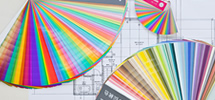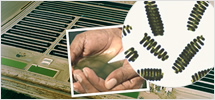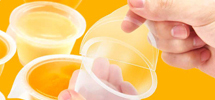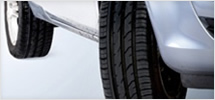Automobile engine peripherals
DIC's PPS compounds are used in automobile engines and engine peripherals.
Helping to improve fuel efficiency
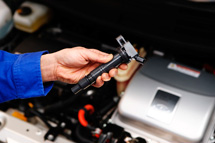
Fuel efficiency is an important concern for car owners everywhere. In recent years, rising awareness of the need to protect the environment has spurred efforts to make vehicles even more fuel efficient, as well as a shift toward next-generation vehicles, including hybrids and electric cars. Does your vehicle get relatively good gas mileage? If so, chances are likely it contains PPS compounds manufactured by DIC.
Making Automotive lighter is an effective way to improve fuel efficiency. Today, lightweight engineering plastics are used in vehicle drive, brake and fuel systems as an alternative to heavier conventional metals. A type of engineering plastic, PPS resin is a heat-resistant crystalline polymer with a high melting point of approximately 280°C. PPS resin is highly resistant to extreme conditions, including high heat and excessive vibration. It is also flame-resistant, eliminating the need to add flame retardants, and provides outstanding resistance to chemical substances, including strong acids and alkalis, organic solvents and oils. These properties make PPS resin the perfect material for reducing vehicle weight while still ensuring engine safety.
Top share of the global market for PPS compounds
DIC supplies compounds (pre-molded materials) made from PPS base resin reinforced with glass fibers to customers around the world and currently enjoys the top share of the global market for these compounds. DIC began manufacturing PPS compounds in 1976 and base resins in 1987 and in the years since has established its own integrated production line, which encompasses all steps from the procurement of raw materials through to compounding.
Leading the markets for products that deliver hardness and softness
There are two types of PPS resin, cross-linked and linear. Cross-linked PPS resin maintains excellent rigidity (hardness) even at high temperatures, and thus is not pliable. In contrast, linear PPS resin boasts outstanding impact resistance because it is tensile. DIC maximizes these properties to respond to various needs with an extensive lineup of products, including those requiring rigidity, increased pliability and a superior cost-performance ratio.
Capitalizing on its advanced compounding technologies, DIC recently succeeded in using long glass fibers as a reinforcement material for PPS, thereby facilitating the development of a new high-strength PPS compound. DIC's new product delivers impact resistance more than four times higher that of conventional PPS compounds made with short glass fibers, while retention of mechanical properties at elevated temperatures is approximately 1.5 times higher and resistance to fatigue under load is approximately 1,000 times greater. Going forward, DIC expects this new compound to find application in components for next-generation hybrid and electric vehicles, evidence of the growing role DIC technologies are playing in the area of automobile production.


